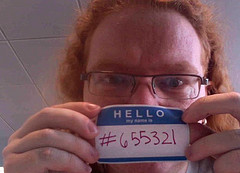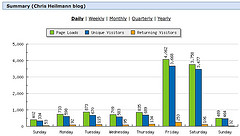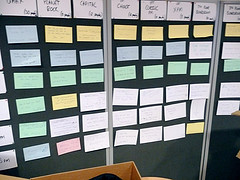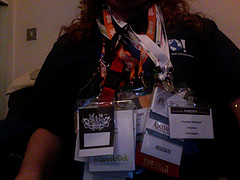Making Your Mark On The Web Is Easier Than You Think
We who work on the Web live in wonderful times. In the past, we did of lot of trial-and-error learning, and the biggest hurdle was getting people to understand what we were on about. Over time, companies like Google, Yahoo, Skype, Facebook and Twitter managed to get the geeky Web into the living rooms of regular people and into the headlines of the mainstream press.
Also consider the following Smashing Magazine articles:
- How To Become A Web Design Expert
- When 24/7/365 Fails: Turning Off Work On Weekends
- Social Media Is A Part Of The User Experience
Now more than ever are there opportunities on the Web for you, as a professional, to be seen and to be found. I am a professional Web spokesperson for a large company, and I spoke at 27 conferences in 14 countries last year. I write for several magazines and blogs and have published a few books. When people ask me how I got to where I am now, my standard answer is: by releasing stuff on the Web and by listening and reacting to feedback. And you can do the same.
There are numerous ways to become known on the Web (or at least to reach out to like-minded people):
- Use social networking tools. This is where the people are.
- Write a (micro) blog. Even if it’s just a scratch pad for your thoughts. This is how mine started.
- Attend unconferences. Everyone who goes is already a presenter, which makes it easy to begin.
- Attend and speak at conferences. Even if it means just asking questions. Conferences are where people find you.
- Partner and build alliances. If you can’t do everything on your own, find someone who completes the set of skills needed.
- Comment on other people’s work. People will find you inspiring if you ask the right questions.
- Build on other people’s work. Can something do almost exactly what you need but not quite? And it’s open source? Fix it for your specific purposes and release it for others who have the same needs.
- Release free code, designs or templates. Nothing gets you noticed more than giving out goodies.
- Listen and prioritize. We already have information overload on the Web; you can be a curator.
Let’s discuss the practical applications of each point.
Use Social Networking Tools
Social networks have the unsurprising yet beneficial feature of being social: you can actually meet people who share the same interests as you. You might stumble over one or another expert who you’d never reach by email or by contacting them through their blog. I, for example, am happy to answer a quick tweet — and maybe even use it as inspiration for a blog post — but I find myself unable, unfortunately, to answer long emails that bring up a lot of issues from people asking me to fix their code.
Social networks are great for sharing successes and ideas. Upload sketches of your products to Flickr, share an office outing on Facebook (only the photos you could show your mother, of course) or create a screencast of some of your tricks and upload them to YouTube. Whatever you put out there can potentially be sent onward by millions of people. If your productions can be found only on your website, most people won’t ever see them.
Be yourself on social networks. Write a truthful bio and list your name, location, interests and other ways to find you on the Web. I get a lot of traffic from my Twitter profile and that wouldn’t be the case if I just had a cartoon dog there and didn’t list my name.
Write a (Micro) Blog
On a blog, you can quickly share thoughts, finds, photos, anything. Not every blog has to be the refined and inspiring output of a Web expert. In the same way, a blog should not become an endless stream of boring anecdotes (like sharing the joys of having bought a new doormat this morning). My own blog, wait-till-i.com, has always been a personal scratch pad if nothing else. If I manage to code something that has always annoyed me in a new way, I’ll write a quick post. If I find someone else who has written something cool, I do the same and give my commentary on it.
Keep in mind that if you host yourself, you’ll have to update regularly and battle spam. If all you want is to jot down interesting things from time to time, just use a service like Tumblr, Soup.io or hosted WordPress.
A lot of people fall into the trap of using their blog as a playground: they try out every cool CSS trick and design idea they’ve ever had and redesign it every three weeks. This is tempting, but this kind of fame is fleeting; months down the line, you’ll probably realize that falling short on content was a mistake. My blog looks minimal indeed, and I do everything one could possibly do wrong in terms of SEO, but it still had a Google Page Rank of 8, and I made good money with ads. I wrote about interesting things and people linked to my blog. If your content is interesting, your blog will show up in RSS readers and in people’s updates in social networks or shared bookmarks. You need good, sensible titles and well-structured content. Looks are not that important.
Staying up to date is important. Don’t write treaties and novels; instead, update often and regularly, and you will have a crowd of followers in no time.
Attend Unconferences
Unconferences (including BarCamp and others like it) are wonderful forums for practicing your public speaking. The cool thing about BarCamps is that everyone who goes has to give a presentation, host a discussion round or do something similar — it won’t just be you up there.
This can be a huge opportunity to speak to people and get a sense of what works for them and what doesn’t. There is no such thing as a failed talk at a BarCamp — just ones that work well and others that are less interesting. Nobody pays to see you, so nothing can be a major disappointment; and because everyone has to speak, there is no incentive to harshly criticize others. There is just no showing off.
If you get a chance to help organize a BarCamp, even better; you’ll get to network early on. Organizing events takes all kinds of people, not just hard-core developers and rock star designers.
Attend and Speak at Conferences
Attend conferences whenever you can. They are priceless opportunities to network and to get to know people who you read about “in the flesh.” It’s a great feeling to ask a question of someone you’ve learned from and respect, and it shows them their work is appreciated.
Don’t get bogged down taking notes; that’s the job of the organizers. Instead, chat a lot, give out cards or — even better — swap Twitter handles. Go with the flow of the conference; if it’s time for beer, then it’s time for beer and chatter, not time to discuss highly technical matters.
Use the time during the talks and after the conference to your advantage: tweet about the talks and what you liked about them using the official hash tag, and publish a “Conference XYZ in my view” blog post as soon as possible. Immediately after a conference, there is much discussion among those who attended, but sometimes even more among those who didn’t. You could be the person who tells the latter group what they missed, and they just might remember you for it.
Keep your eyes peeled for chances to submit proposals for conferences. Clever conference organizers offer a “B” track — alternatives to the main speakers — and that could be your chance to get a foot in the door. There is always a need for fresh speakers, so don’t be shy.
Partner and Build Alliances
If you want to crack a certain problem but you’re not sure exactly how to do it, put it out as a question. A designer and a developer working together on a demo product or article is always better than a single person trying to do everything (and feeling out of their element). Duos can be highly successful, and even if the team is formed just for a one-off, collaboration lets you deliver products while getting to know the working styles of others.
Another useful way to collaborate is to form working groups. The WaSP task forces, for example, work that way and have been immensely successful. Other developers come together under local banners, which can bring collective fame to all involved. The UK-based Britpack is an example of that, as are the Multipack or the Webkrauts in Germany.
Organize some local meet-ups and go from there. This will help you meet like-minded people, and it will help them get to know you.
Comment on the Work of Others
Leaving comments on blog posts is a great way to become known, especially when you leave articulate comments that add to the conversation or explain the subject matter further. There’s no point posting if you’re going to suck up or divert the discussion. And there are enough comments that propose solutions to CSS problems. (“Just use jQuery. Worked for me.”)
Mull over the content of the post and try to think beyond it. Decent comments include:
- “Great article. You can see that in action at XYZ.”
- “Would that also work as a solution to the problem we see at XYZ?”
- “ABC had a similar solution at XYZ, but it lacked feature X, which this solution fixes.”
You get the idea: show people other resources that back up the current solution, or point out problems in the proposed solution that need fixing and build your own.
You could also leave comments that verify or disagree with other comments that have stirred discussion. Being known as someone who prevents flame-wars or steers them to more productive channels is a good thing.
Build on the Work of Others
The wonderful thing about Web development these days is that you can easily build on what other people have done. A lot of hard work gets released as source code or as Creative Commons content.
Instead of writing your own solutions to solve problems that other people have nearly solved, extend their work to do the one thing it’s missing on your terms. Why not extend someone else’s ideas and localize them to your market? This could entail translating and changing some features (removing those that don’t apply and adding those that are needed), but it’s probably worth it. When the Yahoo User Interface Library team created its fonts.css file, it found 12px Arial to be a great readable baseline for Web typography. The Yahoo team in Hong Kong found that 12px Chinese glyphs were too small to read, so they adapted. The YUI team — based in Sunnyvale, California — would never have encountered this issue themselves, so having a local team fix it and feed back the information helped everybody involved.
There is no shame in using other people’s work. All you need to do is learn what it does and then make it better. Understanding the work you’re building on is important; if you leave everything to magic and your extensions break later, your reputation will be tarnished — especially if you can’t explain why it happened.
One problem I encountered when I released some code was that I omitted functionality that was flashy but inaccessible; people started overriding my code to make the solution flashy again. My advice, then, is: before you “fix” code, read the documentation and consider the rationale behind its structure and functionality. The original author probably had good reason to do what he or she did. Using open-source resources is as much about respecting the authors as it is about making your work easier.
Release Free Code, Designs or Templates
Once you’ve seen how easy it is to create great products by building on the skills and research of others, take part: release your products and let others have a go. This is the beauty of the Creative Commons Share-Alike license: you give stuff out but people have to mention you, and they are allowed to release your content only under the same terms and conditions.
So, go ahead: upload your code to GitHub or Google Code; put your photos on Flickr; put your designs and templates on showcase websites like deviantART. By doing this, you reach people where they already hang out, rather than hoping for them to stumble across your work by chance. Most of my contracts for paid work have come from people who found and were impressed by free things that I released.
Listen and Prioritize
A lot of content is on the Web, and keeping up to date on current happenings can be a full-time job. So, even if you don’t want to add to the already buzzing stream of information, you can make your mark by being a good content curator or librarian.
Librarians rock. They don’t know the content of all the books in the library, but they know exactly where everything is and can give you what you need in seconds. You could be that person.
Maintain a good number of RSS feeds, and bookmark them with clear simple notes and proper tags. Use social bookmarking to do the same with content that doesn’t come via RSS feeds. I follow a few people who do nothing but this and they do a splendid job.
One very successful feature of my blog is my “Things that made me happy this morning” column. In it, I list links that I found in my RSS reader and got me excited or prompted a chuckle. I do the same on the official Yahoo Developer Network blog with the Tech Thursday feature. None of this takes much time because I check a lot of websites daily anyway — but I do take time to put them in a list and write a few words about each. It helps me organize my bookmarks, and the world thanks me for it.
Summary
These are just a few ideas you can use to get yourself noticed on the Web. Most are free or fairly inexpensive, so before you spend a lot of money on a social media expert or SEO consultant, have a go on your own. Before you know it, you’ll find yourself enjoying being a known Web citizen. A lot of what I wrote about here is also available in “check box”-style advice in my free Developer Evangelism Handbook.
Don’t hesitate to comment and tell us your tricks, too!






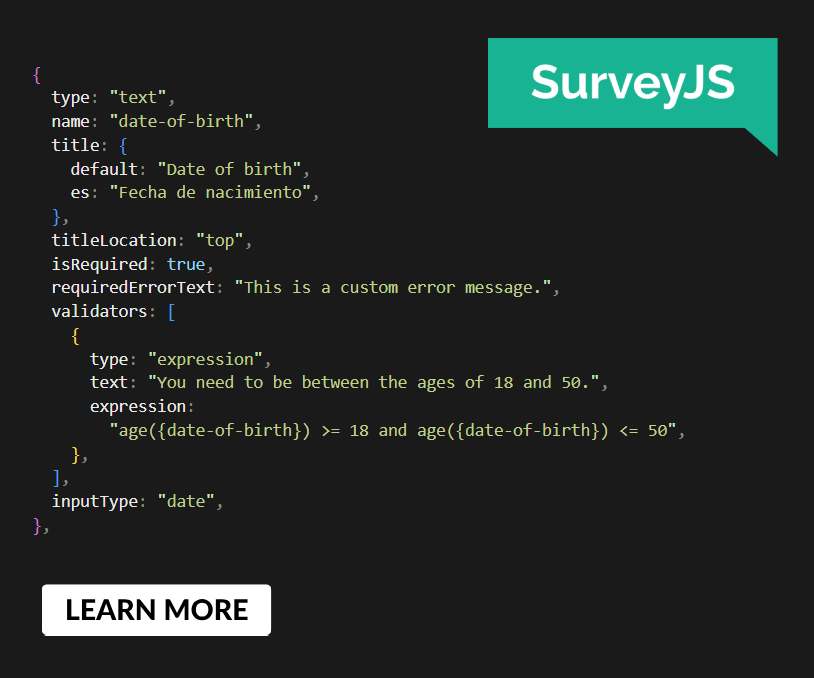 SurveyJS: White-Label Survey Solution for Your JS App
SurveyJS: White-Label Survey Solution for Your JS App Agent Ready is the new Headless
Agent Ready is the new Headless
